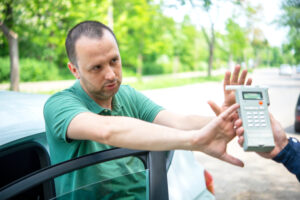Can You Refuse a Breathalyzer in Virginia? What Happens If You Do
October 6, 2025


Do you have to take a breathalyzer, or can you refuse?
What you say—and what you refuse—during a DUI stop in Prince William County can follow you for years. Many believe staying silent or turning down a breathalyzer is the safest route, but Virginia law is designed to punish refusal harshly. One wrong move could mean a license suspension, court battles, and even a criminal record. If you want to avoid common traps that catch drivers every night on Virginia roads, you need the facts before it’s too late.
What Is Virginia’s Implied Consent Law?
Virginia’s Implied Consent Law states that anyone who operates a motor vehicle on a public highway in Virginia automatically agrees to submit to a breath or blood test if arrested for DUI. This law covers every driver in Virginia, and it applies after a lawful arrest based on probable cause—not during the initial roadside stop.
If you refuse a lawfully requested post-arrest breathalyzer, the refusal is not a simple personal choice. Virginia treats refusal as a civil violation with immediate consequences, and subsequent refusals can bring criminal charges. If you’re facing such a situation, speaking with a Virginia DUI attorney at Rudolphi Law can be vital for protecting your rights and options.
The Breathalyzer Refusal
First Refusal – Civil Penalty and License Suspension
On a first offense, refusal of a breathalyzer after a lawful DUI arrest is a civil offense. Under Va. Code § 18.2-268.3:
- Your driver’s license is suspended for 12 months.
- You may petition for a restricted license 30 days after conviction, and the judge may grant one for work, school, or medical needs (§ 18.2-268.3 (E))
- Penalty is imposed even if you aren’t convicted of DUI.
If you rely on your ability to drive for work or family, this can devastate your day-to-day life. A top-rated DUI lawyer in Prince William County offers strategic defense to challenge the legality of the arrest or the validity of the refusal—potentially limiting or avoiding the license suspension.
Subsequent Refusal – Criminal Charge and Harsher Penalties
If you refuse a breathalyzer a second or subsequent time within ten years, the consequences escalate dramatically:
- Class 1 misdemeanor, up to 12 months in jail, and a fine up to $2,500.
- Longer license suspension (3 years), and criminal record implications.
Because subsequent refusals are prosecuted as crimes, you face both criminal penalties and even greater loss of driving privileges. The involvement of criminal lawyers is crucial if you want to avoid or minimize these consequences.
Does Refusal Help or Hurt Your DUI Case?
Many people mistakenly believe that refusing a breathalyzer will prevent prosecutors from building a DUI case. This is a myth in Virginia.
- Prosecutors Can Still Charge You – Law enforcement can still charge and convict you with DUI based on officer observations, field sobriety test performance, and other circumstantial evidence—even without a BAC number.
- Evidence of Refusal – Prosecutors are allowed to argue that your refusal shows a “consciousness of guilt.”
- Search Warrants for Blood Draw – Police may obtain a warrant to compel a blood draw, especially if there was an accident or injuries. Refusal may only delay—not prevent—evidence collection.
A VA DUI attorney with trial experience can challenge the legality of the stop, the probable cause for arrest, and the procedures used in your case.
What About the Roadside Breath Test?
Virginia law draws a clear line between the roadside preliminary breath test (PBT) and the official breathalyzer administered after an arrest. You are legally allowed to refuse the PBT—typically offered before you’re arrested—without facing any administrative or criminal penalties, and this refusal cannot be used as evidence against you in court.
Police use the PBT only to help establish probable cause for a DUI arrest. However, once you have been formally arrested, Virginia’s implied consent law requires you to submit to the evidentiary breath or blood test at the station, and refusal at that stage carries serious consequences. Understanding this distinction is critical—confusing the two tests can mean the difference between exercising a right and triggering penalties.
Protect Your License and Record with Top Virginia DUI AttorneysRefusing a breathalyzer in Virginia may seem like a way to protect yourself, but it comes with license loss, possible jail time for repeat refusals, and no guarantee of avoiding a DUI conviction. The consequences are severe—and the stakes are high. Rudolphi Law combines courtroom experience and deep knowledge of Virginia DUI and drug laws to give clients the strongest possible defense. Call 703-596-9566 or contact us today for an immediate, confidential consultation with a proven VA DUI lawyer.
